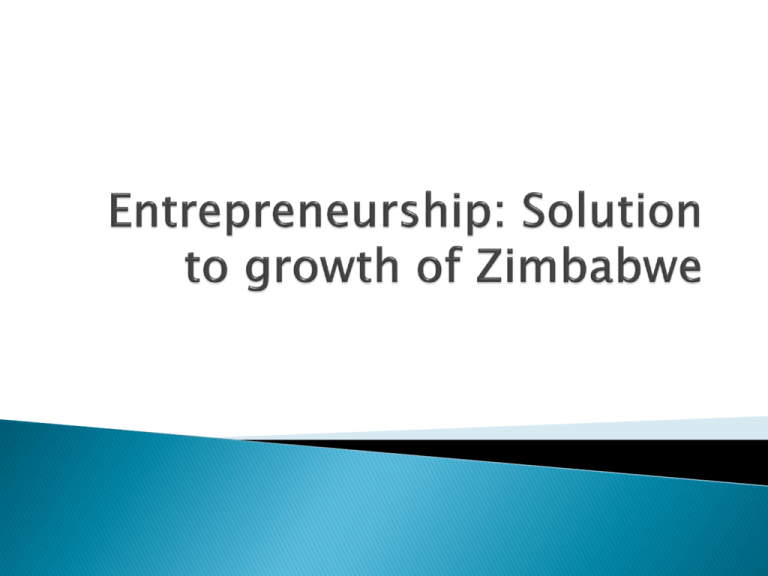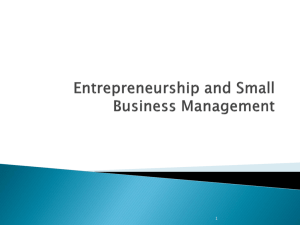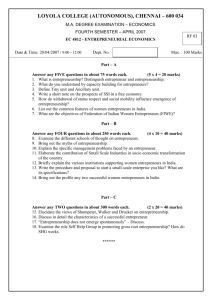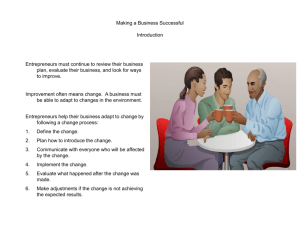The Building Blocks of Entrepreneurship in Zimbabwe
advertisement

Defining entrepreneurship has occupied scholars for many years and to this day there is still lack of consensus on its exact meaning The term is used differently in different contexts and environments The term entrepreneur is derived from the French verb “entreprendre”, meaning “to undertake” . The French economist Richard Cantillon is generally accredited with being the first to coin the phrase in the context of what we view today as entrepreneurship in about 1730. He defined entrepreneurship as selfemployment of any sort, and entrepreneurs as risk takers in the sense that they purchased goods at certain prices in the present to sell at uncertain prices in the in the future. Frank Knight (1885-1972) first introduced the dimension of risk-taking as a central characteristic of entrepreneurship. He considers uncertainty as a factor of production, and notes that the entrepreneur acts in anticipation of future events. The entrepreneur earns profit as a reward for taking such risks. 1934 Joseph Schumpeter came up with a definition of an entrepreneur which ushered in the more modern interpretation which relates entrepreneurship to innovation. Schumpeter defined entrepreneurs as innovators who implement entrepreneurial change within markets. He highlighted that entrepreneurial change has five manifestations: the introduction of a new or improved product or service the introduction of a new method of production the opening of a new market the exploitation of a new source of supply; the re-engineering/organization of business management processes. - Necessity Entrepreneurship which refers to having to- become an Entrepreneur because you have no better option. - Opportunity Entrepreneurship which is an active choice to start a new enterprise based on the perception that an unexploited or under exploited business opportunity exists. While it is easy to see that starting a new business to exploit a perceived business opportunity would lead to economic development, it is also possible that necessity entrepreneurship may not lead to economic development. Being pushed into Entrepreneurship (selfemployment) because all other options for work are either absent or unsatisfactory can even lead to under development. It is a process of searching and exploiting an opportunity. Efforts of an individual who goes against the odds in translating a vision into successful business enterprise. It is a way of life, thinking, acting and attitude towards working entrepreneurship is about innovation, bringing new ideas, new markets, new products and new processes bring notable positive change in the economic, technological and social development of a country. Entrepreneurship is about having the eye to see opportunities and the ability pursue them resulting in the realisation of economic value. It requires passion, the willingness to take risks and the desire to bring about change. Today entrepreneurship is viewed as a driving force for economic growth (Wenneckers and Thurick 1999). Saxenian (1994) demonstrated that the most prosperous and dynamic economic regions were characterized by very high rates of entrepreneurship • Entrepreneurs create new businesses • New businesses create jobs • Increase level of disposable income • New businesses intensify competition • Intensified competition may improve quality • New businesses may increase productivity through technological change Acting as the economy’s guinea pigs Turning inventions into innovations Creating new horizons Entrepreneurs take a concept and turn it into reality Creating new industries by experimenting in market niches that were overlooked by established firms Tackling uncertainty by pursuing competing strategies and responding flexibly to changing conditions Generating competition to established firms WHAT ENTREPRENEURS DO? Poverty Alleviation Taxes/Govt. Revenues Higher Productivity & Innovations EMPLOYMENT & INCOME GENERATION Wealth ENTERPRISES ENTREPRENEURS Output & Exports Allows you to be yourself Is enjoyable and does not seem like work Fulfils you Follows your wants instead of should Gives you energy instead of draining you Enables you to align with your passion and do what you love Your own master Gain influence and respect “ Desire for Success • Dream big and keep on dreaming. If you cannot see it you cannot have it Passion • Love what you do and it will be easy to put in effort. Successful entrepreneurs do not mind putting even 18 hours a day because they love what they are doing Focus Focus on your strengths, do not lose sight of the dream despite the challenges that you may face. Hard work • Brian Tracy – You work 8 hours a day for survival if you want to succeed you have to put in more hours • Working hard will be easy if you have a vision, clear goals and are passionate about what you do. • Desire for knowledge • This is not about degrees and diplomas • To succeed you must be willing to ask questions, remain curious, interested and open to new knowledge • Learning is crucial given the rapid changes in technologies and ways of doing business Perseverance and Faith • Courage to persist in the face of adversity, setbacks and resounding defeat Discipline and diligence • Do what you should do, when you should do it whether you like it or not Planning • If you have a dream/vision write it down and put in place concrete goals that • Plan each day in such a way that each action contributes to the attainment of your vision Networking Your success depends on the company that you keep • Always be alert for opportunities to expand your contacts Failure is not an option • Believe in your goals, have faith in your idea and have confidence in your capabilities and yourself • Mentorship • • • One of the things that makes someone one advance to greatness is to have a coach A mentor is a voice you can listen to, someone who has been there before and has succeeded. A good mentor acts a catalyst to make you achieve your results faster Some say that successful entrepreneurs are born, not made. Others disagree, saying good entrepreneurship is a talent that can be learned and nurtured. The truth probably lies somewhere in the middle. The desire to create and grow a business – large or small – requires a combination of character, talent, vision, energy, timing, and a bit of luck. “Every body stumbles across a golden opportunity at least once in a lifetime. Unfortunately most people just pick themselves up, and others dust off and walk away from it” (Winston Churchhill)







